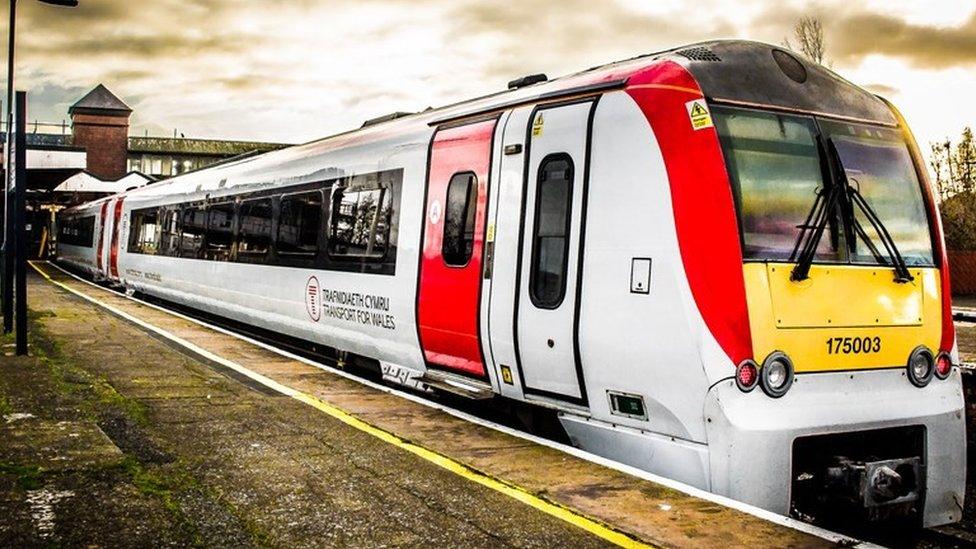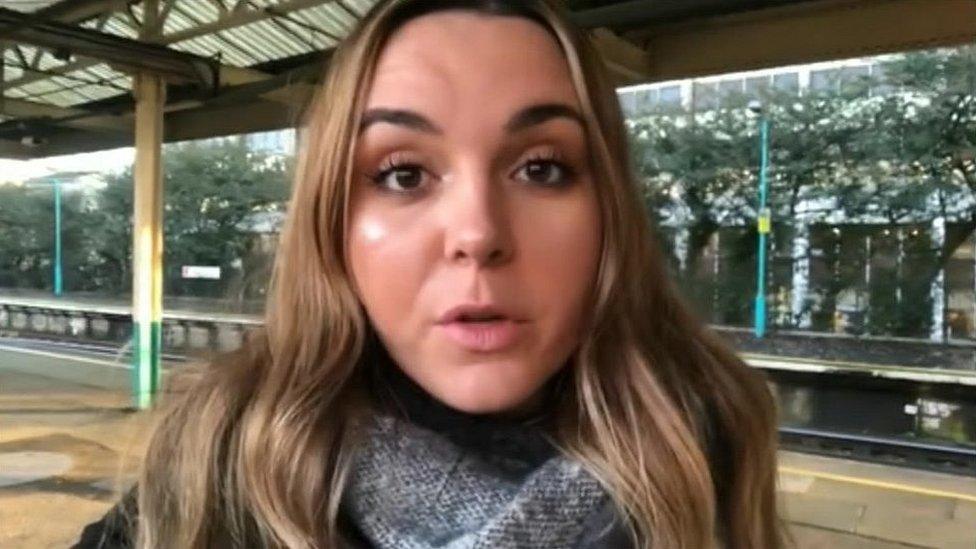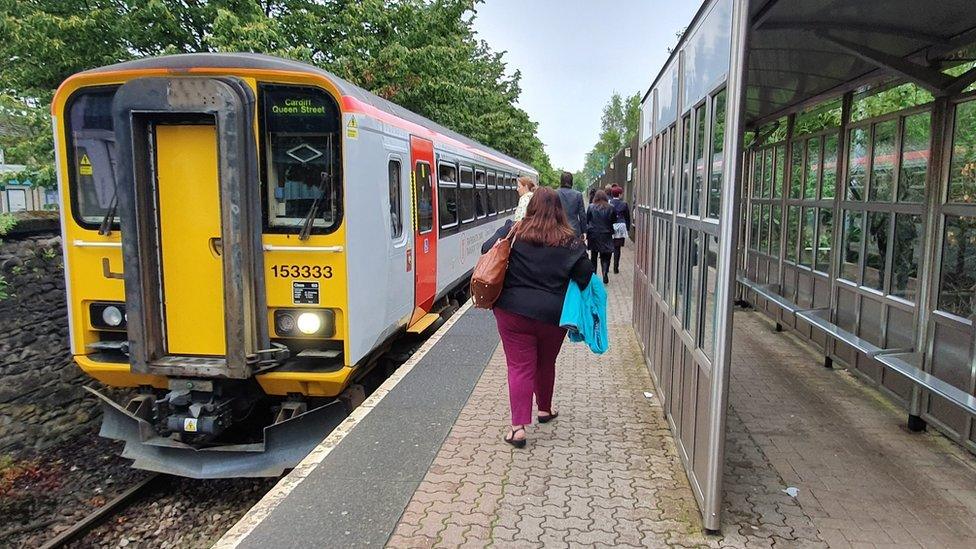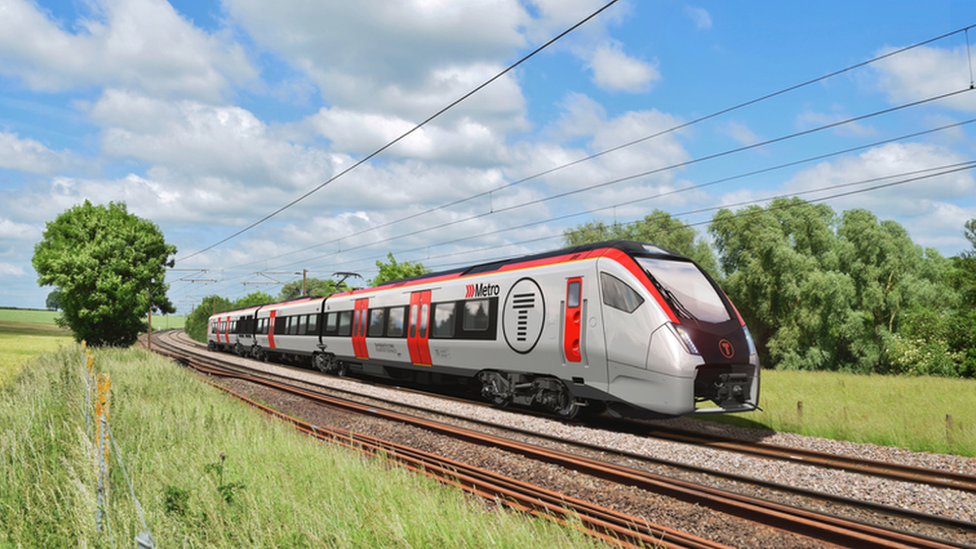Rail: Transport for Wales users 'among least satisfied'
- Published
Train travel: 'People are in the toilets for somewhere to stand'
Rail passengers' opinions of services run by Transport for Wales (TfW) have not improved since the operator took over in 2018, a survey has found.
The Rail Passenger Survey carried out by Transport Focus, external found TfW's rail passengers were among the least satisfied in the UK.
The percentage of customers satisfied with their journey in autumn 2019 was 79%, compared with 82% in 2018.
TfW said they were looking to increase capacity ahead of new trains in 2023.
The operator, which runs services throughout Wales and some cross-border services to England, was the fourth-lowest ranked operator out of the 24 in the UK.

Transport for Wales is introducing a new fleet of trains in 2023
The highest rated was Heathrow Express at 96%, followed by Grand Central at 94%, which runs services along the east coast of England.
Satisfaction with value for money on TfW was slightly better than the UK average, but had fallen significantly among weekday customers to 48%, compared to 57% in 2018.
The overall sample size of passengers surveyed for TfW's services was 1,026.
Transport Focus' chief executive Anthony Smith said: "Almost eight in 10 TfW passengers are satisfied overall, but this score hasn't significantly improved from last year.
"It is also worrying to see that the availability and helpfulness of staff in stations appears to be on a downward trend."
'People just can't get on'
Brittany Stephens told BBC Radio Wales Breakfast nothing had changed "drastically" on her commute from Aberdare to Cardiff over the past year.
"They need more carriages per journey. That's the main thing I am noticing because a lot of people just can't get on.
"A lot of the trains are very, very old so they are in need of a refurb," she said.
"It's quite hectic in the mornings. You have a lot of people jumping on the train. As you get past Pontpridd, it gets quite busy.
"Usually on the way back home you don't get a seat or you will miss a train."

Lauren Williams-Jones said services were late most of the time
Lauren Williams-Jones, 22, who commutes from Porth in Rhondda to Cardiff on the 07:40 service, said the train was late most of the time.
"It's overcrowded; a lot of the time it's just standing room.
"I've seen people stand in the toilet on their commute because there's literally no room on the train and it's the only place left to stand," she said.
"And on the way home it's even worse, with people trying to get back up the valley.
"I've often had to miss two or three trains because there isn't any room to get on the train. So that can add an extra hour to my commute."
However she said things had got better since TfW took over from the previous operator Arriva, adding: "I do see more carriages being put on daily but it's still not enough and delays are still a big issue.
"I've seen my monthly cost go up. I now pay £99 a month, that's gone up by £5 in past year. So I'm paying nearly £1,200 a year to stand on a delayed train."


Analysis from Brian Meechan, BBC Wales business correspondent
These figures will be a disappointment for both Transport for Wales and the Welsh Government.
Turning around decades of rail underinvestment in a year was always going to be impossible.
However, they might have hoped the extra investment and service changes that have already been implemented would have made passengers more positive about travelling by train.
Passengers may have expected improvements within the first year given the fanfare with which Transport for Wales and its £5 billion investment was launched.
The survey suggests they are feeling less satisfied compared with the previous Arriva Trains Wales period on key measures including overall journey, reliability and value for money.
This comes as Cardiff council is proposing a congestion charge to drive into the city.
Having good public transport is one of the best ways of getting people out of their cars.
Passengers on valley lines in particular may feel they will be charged for driving under the plan - without improved public transport being put in place first to give them a real alternative.

'Capacity issues'
Bethan Jelfs, TfW's customer delivery director, said the survey was one of a number of performance measures for customer service.
"We introduced our passenger time lost measure which drives performance improvement by ensuring that we are at the station when we said we would be."
She said it had focused on investing in technology over the past year and were also deep cleaning the last of the company's 247 stations.
She added: "We know capacity issues impact our customers and the December timetable allowed us to make some targeted improvements on our busiest routes, and we are looking for ways that we can increase this further ahead of the introduction of our new fleet coming on line 2023."
- Published9 January 2020

- Published14 December 2019

- Published20 November 2019

- Published15 October 2019
